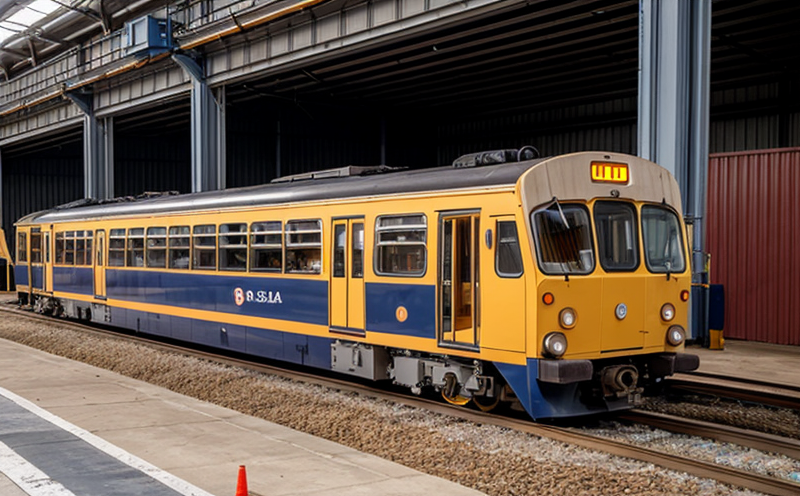EN 13749 Fatigue Testing of Yaw Dampers and Mounts
The EN 13749 standard provides a comprehensive framework for the fatigue testing of yaw dampers and mounts, which are critical components in railway and transportation systems. These components play an essential role in maintaining stability and safety during dynamic loading conditions such as acceleration, braking, and cornering. The primary objective of this test is to ensure that these components can withstand repeated stress cycles without failure, thereby enhancing the overall reliability and safety of rolling stock.
The fatigue testing process involves subjecting specimens to a controlled environment where they are subjected to cyclic loading conditions simulating real-world operating scenarios. This ensures that any potential weaknesses or flaws in design and manufacturing are exposed before deployment into service. Compliance with EN 13749 is mandatory for manufacturers wishing to secure certification, thus ensuring product safety and reliability.
The testing protocol outlined in EN 13749 specifies the range of cyclic loading frequencies that must be applied to simulate various operational conditions. It also defines the number of cycles required based on the expected service life of the component. This ensures that fatigue testing is not only rigorous but also relevant to real-world applications.
During the test, critical parameters such as displacement, force, and strain are continuously monitored using high-precision instrumentation. The data collected during these tests provide valuable insights into the behavior of yaw dampers and mounts under dynamic loading conditions. This information is crucial for identifying potential areas of improvement in design or manufacturing processes.
The results from EN 13749 fatigue testing are used to assess the durability and reliability of yaw dampers and mounts. Compliance with this standard ensures that these components meet stringent quality standards, which ultimately contributes to enhanced safety and performance in railway vehicles.
Compliance with EN 13749 is not just about meeting regulatory requirements; it's also an investment in product quality and customer satisfaction. By adhering to this standard, manufacturers can demonstrate their commitment to producing high-quality products that meet international standards, thereby gaining a competitive edge in the market.
| Applied Standards |
|---|
| EN 13749:2016 - Railway applications - Fatigue testing of yaw dampers and mounts. |
Applied Standards
The EN 13749 standard is a crucial document that specifies the requirements for fatigue testing of yaw dampers and mounts in railway applications. This standard ensures that manufacturers can produce components that are reliable, safe, and capable of withstanding the dynamic loading conditions experienced by rolling stock during operation.
| Standard | Description |
|---|---|
| EN 13749:2016 | Railway applications - Fatigue testing of yaw dampers and mounts. |
Eurolab Advantages
At Eurolab, we pride ourselves on offering world-class fatigue testing services for yaw dampers and mounts in compliance with the EN 13749 standard. Our state-of-the-art facilities and experienced technicians ensure that our clients receive accurate, reliable results every time.
- Comprehensive testing capabilities covering a wide range of parameters.
- High-precision instrumentation for continuous monitoring during tests.
- Dedicated team of experts with deep knowledge and experience in railway applications.
- Robust quality management systems to ensure consistent performance.
Competitive Advantage and Market Impact
Compliance with the EN 13749 standard is not only a regulatory requirement but also a key differentiator in the market. By ensuring that our yaw dampers and mounts meet these stringent standards, we help our clients achieve superior product quality and reliability.
- Increase customer confidence through compliance with international standards.
- Enhance product safety and performance, leading to reduced maintenance costs.
- Achieve competitive advantage by offering high-quality products that meet strict regulatory requirements.
- Promote sustainable development by ensuring the longevity of components in railway systems.





